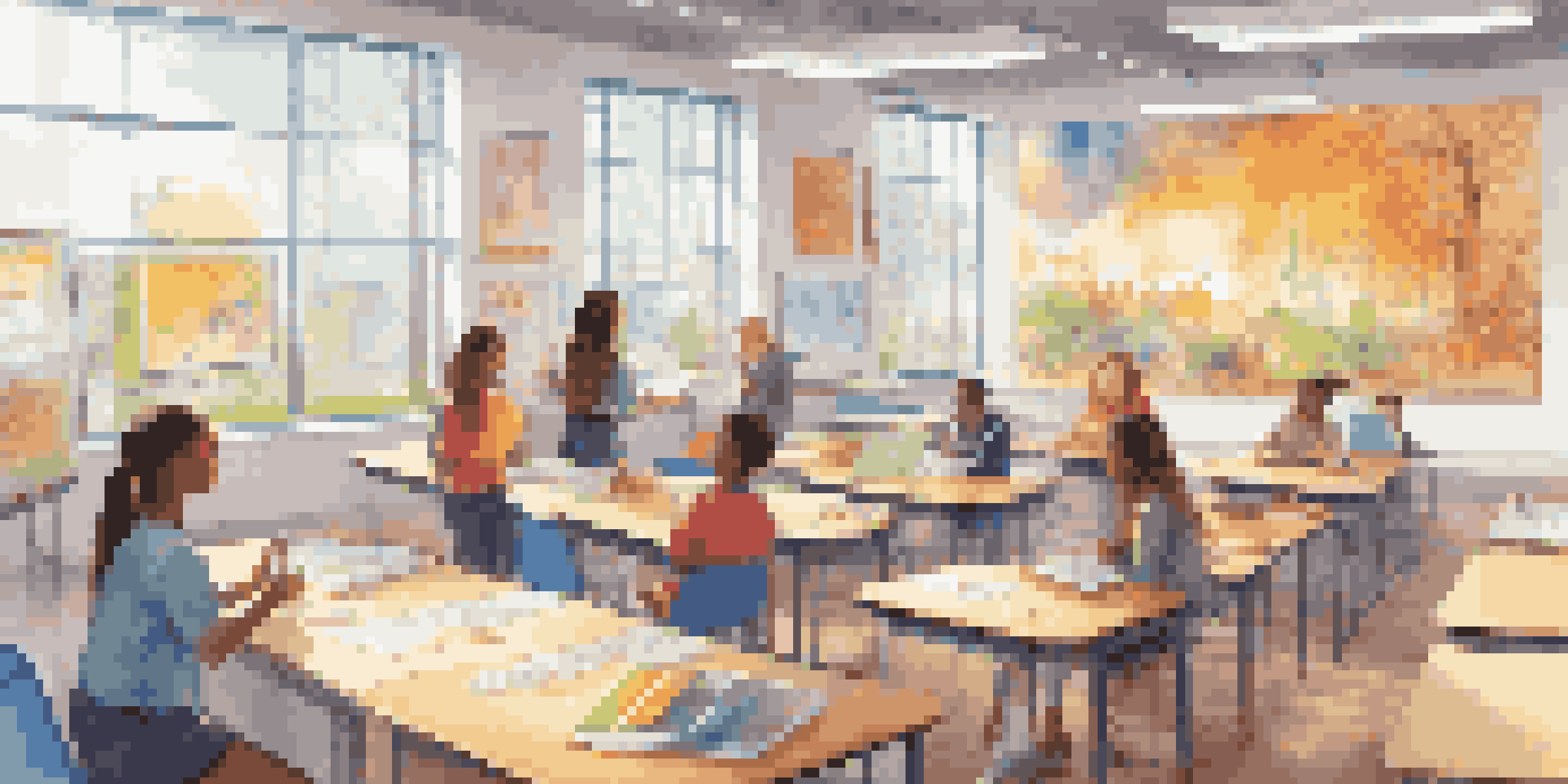The Future of Education: Trends Shaping Learning Experiences

Personalized Learning: Tailoring Education to Individual Needs
Personalized learning is gaining traction as educators recognize that each student has unique strengths and challenges. By leveraging technology, teachers can create customized learning paths that cater to individual preferences, ensuring that students remain engaged. For instance, platforms like Khan Academy allow learners to progress at their own pace, mastering concepts before moving on.
Education is not the filling of a pail, but the lighting of a fire.
This shift towards personalization not only enhances student engagement but also fosters a deeper understanding of the material. Imagine a classroom where students choose their projects based on their interests, making learning more relevant and enjoyable. As personalized learning continues to grow, we can expect to see more adaptive technologies that offer tailored resources.
Ultimately, personalized learning empowers students to take charge of their education, encouraging a love for lifelong learning. This trend is not just about technology; it's about creating a more inclusive and responsive educational environment that meets every learner's needs.
The Rise of Online Learning: Flexibility for All
Online learning has become a staple in modern education, offering unparalleled flexibility for students of all ages. Whether it's a college course or a skill-building workshop, online platforms provide access to a wealth of resources that traditional classrooms may not. This format allows learners to study on their terms, fitting education into their busy lives.

Furthermore, the COVID-19 pandemic accelerated the adoption of online learning, demonstrating its viability as a primary mode of education. Many institutions have embraced hybrid models, combining in-person and online experiences. This flexibility not only accommodates diverse learning styles but also helps break down geographical barriers, allowing students from various backgrounds to connect.
Personalized Learning Enhances Engagement
Personalized learning tailors education to individual needs, fostering deeper understanding and engagement among students.
As we move forward, online learning is likely to evolve further, integrating immersive technologies like virtual reality. This will create even more engaging and interactive learning experiences, making education accessible to everyone, regardless of location.
Embracing Technology: Tools Transforming Classrooms
Technology is revolutionizing the way we approach education, with tools like interactive whiteboards and educational apps enhancing the learning experience. These innovations make lessons more engaging and help students grasp complex concepts more easily. For instance, using simulations in science classes allows students to experiment in a safe virtual environment.
The future belongs to those who believe in the beauty of their dreams.
Additionally, artificial intelligence is beginning to play a role in education by providing real-time feedback and support to students. Imagine having a tutor that’s available 24/7, ready to assist with homework questions or provide extra practice. This level of support can significantly boost a student’s confidence and academic performance.
As technology continues to advance, educators must stay informed about the latest tools and how to integrate them effectively into their classrooms. The goal is not just to use technology for its own sake, but to enhance learning outcomes and create a more dynamic educational landscape.
The Importance of Social-Emotional Learning (SEL)
Social-emotional learning (SEL) is gaining recognition as a crucial component of education, focusing on developing students' emotional intelligence alongside academic skills. By teaching students how to manage emotions, set goals, and build relationships, we are preparing them for real-world challenges. Schools are increasingly incorporating SEL programs into their curricula to foster a supportive environment.
Research shows that SEL can lead to improved academic performance, reduced behavioral issues, and better mental health outcomes. When students feel emotionally supported, they are more likely to engage in their learning. Think of SEL as the foundation of a house; without it, everything built on top can become unstable.
Online Learning Offers Flexibility
The rise of online learning provides students with the flexibility to study at their own pace, accommodating diverse lifestyles.
As the educational landscape evolves, prioritizing SEL will be essential in creating well-rounded individuals who not only excel academically but also thrive in their personal and professional lives. This trend reflects a broader understanding of what it means to be educated in the 21st century.
Global Learning: Bridging Cultures Through Education
Global learning is an emerging trend that encourages students to understand and appreciate diverse cultures and perspectives. In a world that is increasingly interconnected, fostering global citizenship is essential. Programs that promote international collaboration and exchange allow students to learn from one another, broadening their horizons.
For example, virtual exchange programs enable classrooms from different countries to connect and collaborate on projects. This not only enhances language skills but also fosters empathy and understanding among students. Imagine a classroom where students are discussing climate change solutions with peers from across the globe—this exposure can inspire innovative thinking.
As educational institutions embrace global learning, they prepare students to navigate an increasingly complex world. This trend not only benefits individual learners but also contributes to building a more tolerant and interconnected society.
Gamification: Making Learning Fun and Engaging
Gamification is transforming education by incorporating game-like elements into the learning process. This approach motivates students and makes learning more enjoyable, turning what could be mundane tasks into exciting challenges. For instance, using points, badges, and leaderboards can encourage healthy competition and foster a sense of achievement.
Research indicates that gamified learning can improve retention rates and encourage deeper engagement with the material. When students are actively involved in their learning, they are more likely to participate and take risks. Imagine a history lesson where students earn points for completing quests related to historical events; this level of engagement can make the subject come alive.
Gamification Boosts Learning Fun
Incorporating game-like elements into education makes learning enjoyable and improves student engagement and retention.
As gamification becomes more prevalent, educators must find the right balance between fun and educational value. The goal is to create a learning environment that is both stimulating and effective, ultimately leading to better outcomes for students.
Lifelong Learning: Preparing for a Rapidly Changing World
In today’s fast-paced world, the concept of lifelong learning is more important than ever. With technology evolving rapidly, the ability to continuously acquire new skills and knowledge is essential for career advancement and personal growth. Educational institutions are increasingly recognizing this need and are offering resources and programs that support lifelong learners.
For instance, many universities now provide online courses and workshops aimed at adult learners seeking to upskill or pivot in their careers. This approach not only caters to the needs of modern professionals but also encourages a culture of continuous improvement. Imagine a world where learning doesn’t stop after graduation; this mindset can lead to endless opportunities.

As we look to the future, fostering a love for lifelong learning will be crucial in helping individuals adapt to changes in the job market and society. This shift reflects a broader understanding that education is not a destination but a lifelong journey.